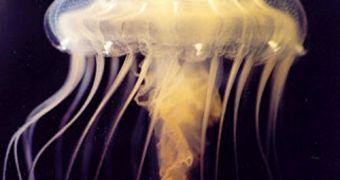When researchers at the Virginia Institute of Marine Science (VIMS) investigated the role of jellyfish in the oceans, they discovered that the creatures tended to alter marine food webs considerably.
The way this was done was by redirecting food energy more towards bacteria than towards higher, more complex lifeforms. Usually, jellyfish are considered to be nothing but a nuisance to fishermen and tourists using the waters for their own enjoyment.
In recent times, people managing coastal and estuarine waters around the world have begun reporting an increased incidence of jellyfish blooms. The trend does not appear to be abating, researchers say.
They explain that – given the influence the marine creatures have had on the food webs thus far – it stands to reason that the intensity of their effects on the environment will go up in future years.
Using funds provided by the US National Science Foundation (NSF), former VIMS graduate student Rob Condon and his team conducted the new investigation with the intent of figuring out what other effects the marine creatures had on their surroundings.
Details of the new work appear in this week's issue of the esteemed journal Proceedings of the National Academy of Sciences (PNAS). Condon is now a research scientist at the Dauphin Island Sea Lab (DISL), in Alabama.
Researchers from VIMS, the Université du Québec à Montréal, the Université Montpellier in France, DISL, and the Marine Biological Laboratory in Woods Hole, Massachusetts, were also a part of the new investigation.
The study was carried out on jellyfish in the York River, which is a tributary of the Chesapeake Bay, on the eastern coast of the United States. “This intriguing finding demonstrates that changes at the top of the food web can affect even the most fundamental ecosystem processes,” David Garrison explains.
The expert holds an appointment as the director of the NSF Biological Oceanography Program (BOP), which provided the funds for Condon's team. The experimental portion of the study took place in Canada, France and the United States.
“Jellyfish are voracious predators,. They affect food webs by capturing plankton that would otherwise be eaten by fish, and converting that food energy into gelatinous biomass,” the team leader says.
“This restricts the transfer of energy up the food chain, because jellyfish are not readily consumed by other predators,” he concludes.

 14 DAY TRIAL //
14 DAY TRIAL //